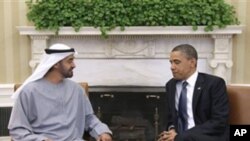At the White House on Tuesday, President Barack Obama met with Crown Prince Mohammed bin Zayed Al Nahyan of Abu Dhabi. They discussed NATO-led military operations in Libya and developments across the region.
Aside from a brief photo opportunity, there was no media access to the discussions, which were divided into an initial round of talks, and a second round of extended bilateral discussions.
The United Arab Emirates is one of two Middle East countries, Qatar is the other, participating in NATO-led military operations in Libya, and sent aircraft to help enforce the no fly zone under U.N. Security Council Resolution 1973.
The White House issued a brief statement on the talks, calling them productive, wide-ranging and focused on common strategic interests in the region. But it did not mention Libya or detail what was said about military operations there.
Press Secretary Jay Carney said the discussions would cover the range of developments across the region. "I think the region is the focus of those conversations. Regional security in general would probably be the principal focus, so that would not be limited to one country," he said.
A more detailed statement by the Emirates News Agency said President Obama and the crown prince discussed UAE support for efforts in Libya along with recent developments in the Middle East, including bilateral and multilateral efforts to improve stability, and prevent the spread of extremism in the region.
The news agency account also mentioned separate meetings the UAE leader had with other U.S. officials, including Defense Secretary Robert Gates and U.S. Homeland Security Secretary Janet Napolitano, which it said focused on strategic and military cooperation.
There was no indication of the extent to which the talks covered internal events in the United Arab Emirates or specifics about unrest in nearby countries such as Bahrain and Yemen.
UAE police were part of a Saudi-led military force called in by the Bahrain government in March to help put down demonstrations by thousands of people demanding political reforms from the kingdom's Sunni-dominated government.
The UAE has not seen the kind of pro-reform unrest that has occurred elsewhere in the Middle East and North Africa. But human rights groups say the government has been ratcheting up pressure on dissidents.
Five activists in the UAE, including prominent Internet bloggers, were detained after signing an online petition urging political reforms. The government recently dissolved the board of a prominent legal group, a move that U.S.- based Human Rights Watch says was part of a broader crackdown on peaceful dissent.
Tuesday's Oval Office meeting marked the second time in two weeks that President Obama has met with an Arab Persian Gulf state leader.
Earlier this month, Obama and Qatar's Emir Hamad Bin Kahlifa al-Thani discussed Libya, other regional developments and the Israel-Palestinian peace process.
Obama, UAE Leader Discuss Mideast Issues at White House
- By Dan Robinson





